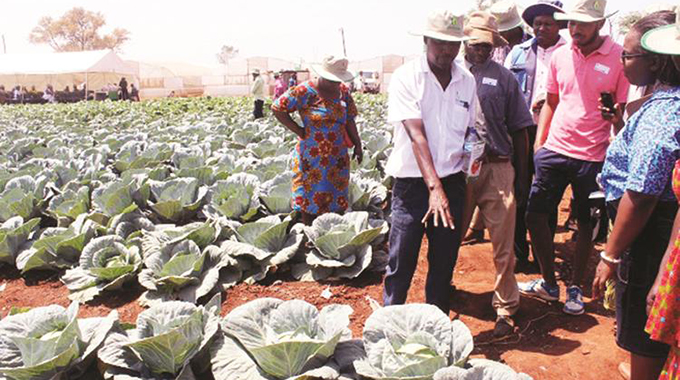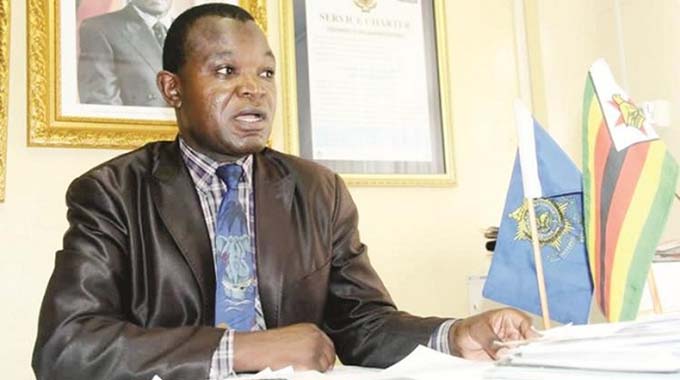Valley flourishes with farming activities

Rumbidzayi Zinyuke Manicaland Bureau
Lying less than 20 kilometres away from the city of Mutare, the little known of Sunny Valley has become a hive of agricultural activity.
Originally known as Madziro farm, the sprawling piece of land has over the years been subdivided into smaller plots of two or so hectares where those who could afford bought land.
Some of those who bought land in the peri-urban area just wanted to own a home in Mutare but due to the cumbersome process to access housing stands, they had no choice but to opt for the periphery areas of the town.
But for others, it was an opportunity to get a small piece of land for farming activities.
For Mr Henry Marapira, retiring from the Zimbabwe Prisons and Correctional Services a few years back left him with a bit of capital to buy the small piece of land where he could get away from the hustle and bustle of the city, and live a more sedate life.
But being idle during the Covid-19 lockdown that has entered its third month, saw him exploring how he can utilise his 1,2 hectare plot.
In the past, he only grew maize for his family to have food but this year, he has a thriving crop of 4200 heads of cabbage almost ready for the market.
Another 5 200 heads have also been planted.
Besides this, he has road runner chickens, a small herd of goats and sheep as well as a small vegetable garden. He is doing well for a peri-urban farmer.
“We were very reluctant to start farming even though we had a drip irrigation system in place. Because of the Covid-19 national lockdown, we had a lot of time on our hands so we thought we could divert our focus to the cabbage project and l think we are doing well. Our plot is very small but the good thing is we have a lot of water which is a very important component when it comes to farming,” he said.
He said he planted the Fabiola hybrid variety of cabbage which only needs 72 days to mature. The first crop will be ready for the market by mid-July.
To cut costs, Mr Marapira engaged the services of a horticulture expert who has been managing the project and will get 25 percent share of the profit as compensation for his expertise.
“An important aspect when it comes to farming is the expertise but the problem we have as small scale farmers is that we do not take farming as a business. But our economy is agro-based and it does not matter if the land you are working on is small or big, you should make maximum use of it for you to get the best possible results from it. Because we are doing small scale, we would never have been able to pay a salary for a manager so the expert comes in and does the best he can because he will get to share profits with us,” he said.
While most farmers have complained about the cost of electricity to power irrigation, Mr Marapira invested in two efficient solar systems which are pumping water from the borehole he drilled and a nearby stream. The solar system also supports all their household energy needs.
According to him, solar is a once off cost which is more sustainable in agriculture than electricity, especially for small scale production.
“In the future, we want to make the maximum use of this small piece of land. We want to construct a greenhouse and start a fish project.
“We also have a goat project that we want to grow but because of the size of our land, we might be limited on the number of goats we will have. We are also targeting to increase the road runner chicken project. Last year we had a good maize harvest so we can produce our own stock feed,” he said.
He said he has started looking for markets for his cabbages to ensure that once the crop is ready, it does not stay in the field too long.
He said it was important for farmers to produce enough to feed their families as it would push them to increase production in future.
Government has been encouraging those with land to utilise it to ensure food security and eradication of poverty.
According to Vice President Chiwenga, the time for importing food is long gone and everyone with land, even the smallest piece, should make it productive.
Speaking at launch of the Presidential Heifer pass-on Scheme at Taguta Farm in Chipinge recently, VP Chiwenga said Government wanted to make sure that food production increases.
“We are not fully utilising our water resources. We cannot continue taking the foreign currency we get from exports to import food. Covid-19 has affected all countries and it is no longer business as usual. No country is producing food for others, they are all worried about feeding their nationals after this pandemic is over. If we do not grow our own food, we will face hunger so we need to grow enough food for ourselves.
“Wherever there is water, we should have farming activities even if it’s a small piece of land, that is enough to make a meaningful contribution. Once we do this, Zimbabwe will once again become a breadbasket not only for the region but for the whole of Africa,” he said.









Comments